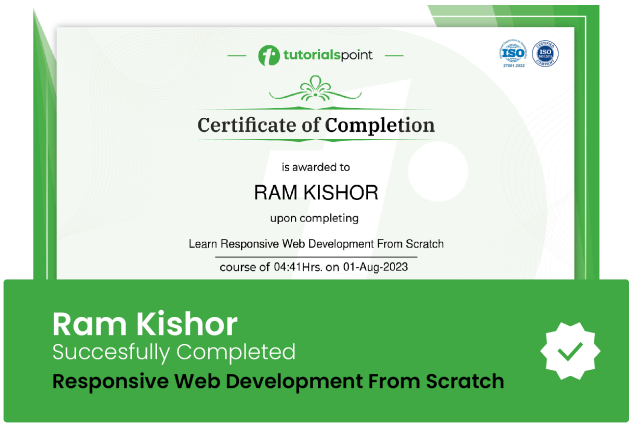JUnit 5 Complete Course
Master JUnit 5 testing framework end to end with in-depth practical examples and demonstrations.
Lectures -57
Duration -7.5 hours

30-days Money-Back Guarantee
Get your team access to 10000+ top Tutorials Point courses anytime, anywhere.
Course Description
JUnit 5 is the latest version of the popular Java testing framework. It provides a number of new features and improvements over previous versions of JUnit.
This online video course will teach you everything you need to know to learn JUnit 5 from scratch. You will learn about the basics of JUnit 5, such as writing test cases, running tests, and using assertions. You will also learn about more advanced topics, such as test fixtures, parameterized tests, and custom runners.
A Practical Guide To JUnit 5 Overview
JUnit5 is the most well-known and often utilized Java unit testing framework. You will discover how to set up and use the JUnit 5 testing framework in this course, step by step. You will learn how to write unit tests using JUnit 5 in this course, and you'll also learn about assertions, assumptions, parameterized tests, repeated tests, and other topics.
Learn JUnit 5 from scratch and discover the latest features and improvements that make it the best Java testing framework yet. Learn how to write comprehensive and reliable tests for your Java applications, automate your testing process, and get advice from experienced JUnit 5 developers.
By the end of this course, you will be able to use JUnit 5 to write comprehensive and reliable tests for your Java applications.
Goals
What will you learn in this course:
Write Java unit tests in the next-generation JUnit 5 framework
Learn the JUnit framework along with its new features of JUnit 5
Learn about the new JUnit 5 Architecture
Learn about the new Assertions API in JUnit 5
Test exceptions in Java unit tests
Test performance in Java unit tests
Learn by coding JUnit 5 features
Learn about the new Assumptions API in JUnit 5
Write Parameterized tests in JUnit 5
Run JUnit 5 tests with Maven
Write Repeated tests in JUnit 5
Prerequisites
What are the prerequisites for this course?
Basic knowledge and installation of Java 8
Basic knowledge of JUnit 4
Eclipse or IntelliJ IDE

Curriculum
Check out the detailed breakdown of what’s inside the course
Getting Started
2 Lectures
-
Welcome !!!
-
Source code
Introduction to JUnit 5
2 Lectures

Writing Tests in JUnit 5
2 Lectures

Assertions in JUnit 5
7 Lectures

Testing Collections
2 Lectures

Testing Performance
2 Lectures

Testing Exceptions
1 Lectures

Display Names in JUnit 5
1 Lectures

Disabling Tests in JUnit 5
1 Lectures

Assumptions in JUnit 5
7 Lectures

Test Instance Lifecycle
9 Lectures

Parameterized Tests in JUnit 5
13 Lectures

Repeated Tests in JUnit 5
4 Lectures

JUnit 5 Maven Integration
3 Lectures

Instructor Details

Dinesh Varyani
eCourse Certificate
Use your certificate to make a career change or to advance in your current career.

Our students work
with the Best


































Related Video Courses
View MoreAnnual Membership
Become a valued member of Tutorials Point and enjoy unlimited access to our vast library of top-rated Video Courses
Subscribe now
Online Certifications
Master prominent technologies at full length and become a valued certified professional.
Explore Now


 Updated on Apr, 2024
Updated on Apr, 2024
 Language - English
Language - English
